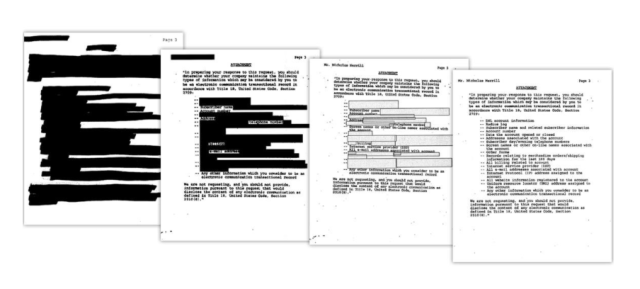The National Security Letter (NSL) is a surveillance tool that allows the government to acquire an array of private information without a warrant. Federal investigators issue thousands of them each year to banks, ISPs, car dealers, insurance companies, doctors, and so forth. The letters do not need a judge’s signature and forbid the disclosure of the NSL to the public or target.
NSL orders significantly increased in the wake of 9/11 terrorist attacks as they became part of the USA Patriot Act. Between 2003 and 2005, the FBI issued 143,074 NSLs according to a Justice Department inspector general report.

As part of a First Amendment lawsuit, a federal judge ordered the release of what the FBI was seeking from a small ISP as part of an NSL – an act done for the first time, exposing the letters. The FBI was demanding a target’s complete Web browsing history, IP addresses, and records of all online purchases, according to the court document that was released Monday. The only thing required is an agent’s signature stating that the information is relevant to the investigation.
“The FBI has interpreted its NSL authority to encompass the websites we read, the Web searches we conduct, the people we contact, and the places we go. This kind of data reveals the most intimate details of our lives, including our political activities, religious affiliations, private relationships, and even our private thoughts and beliefs,” Nicholas Merrill said, who was president of Calyx Internet Access in New York when he received the NSL targeting one of his customers in 2004.
The FBI demanded information on one of Merrill’s customers, but he fought the order in what turned into an 11-year legal battle to expose what the bureau was seeking. His lawsuit took six years before he was even able to say he received an NSL targeting one of his own and litigation finally closed Monday, giving Merrill the victory he yearned for and exposing what the FBI was demanding.
The government fought the disclosure of the document detailing what the FBI was seeking, claiming exposure would harm national security, but a judge disagreed.
“If the Court were to find instead that the Government has met its burden of showing a good reason for non-disclosure here, could Merrill ever overcome such a showing?” US District Judge Victor Marrero ruled. “Under the Government's reasoning, the Court sees only two such hypothetical circumstances in which Merrill could prevail: a world in which no threat of terrorism exists, or a world in which the FBI, acting on its own accord and its own time, decides to disclose the contents of the Attachment.”
In January, President Obama directed the Justice Department to “amend” gag orders so they are no longer permanent. The new direction orders the FBI to terminate National Security Letter nondisclosure orders at the earlier of three years after opening a fully predicated investigation or at the close of one.
Source: Ars Technica
Advertisement
Learn more about Electronic Products Magazine





